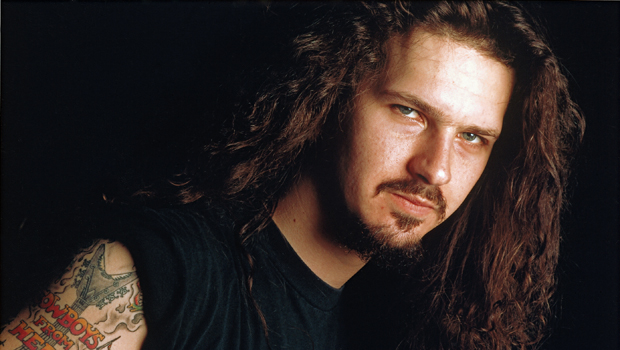Riffer Madness: Dimebag Darrell on Syncopated Rhythms, Part 1

This entry comes from Dimebag Darrell's classic Guitar World column, "Riffer Madness."
In the last few columns we've been zoning in on lead-playing and shit so let's get back to doing some hard-driving rhythm work for a while-'cos well-balanced players rip on rhythm as well as leads.
As far as I'm concerned, it's no good being able to wail out smokin' leads if your rhythm chops hugg! I've been into playing rhythm from day one, and a lot of that has to do with having a brother who kicks ass on drums. I grew up jamming with Vinnie [Paul, Darrell's brother and Pantera's skin-basher] and he definitely taught me the importance of timing and playing tight-and that, along with some great chops, is what rhythm playing is all about.
Percussive Picking
In a way, I'm kind of a percussionist when it comes to picking because a lot of my rhythm patterns are almost like drum patterns-take the front of "A New Level" (Vulgar Display Of Power) (Figure 1) which is a hard-driving power groove based on one note, the open low E string (tuned down a whole step to D).
I actually came up with the idea for this riff by beating on one of those little crystal glasses with some chop sticks at Benihana's! Most riffs are recognizable by their melody, and the fact that you can immediately identify Figure 1 as being "A New Level" from just its rhythmic pattern shows you how important timing and rhythm is! So, in the case of this riff, the focus is on right-hand chops rather than melody.
Psychotic Syncopation
A lot of Pantera's riffs are tight, syncopated grooves like the one we've just looked at. Check out the riff shown in FIGURE 2, which is the beginning of "Psycho Holiday" (Cowboys From Hell).
Once again, only one note is being hit (F), but you know exactly what the song is, thanks to the rhythmic pattern being pounded out. Anyway, before we go any further, I guess I should explain what syncopation is all about, just so we're clear.
All syncopation means is accenting beats that you don't normally accent. If this sounds complicated, don't wig, just hold tight and we'll clean this scene up. Let's say you're chugging out a simple eighth-note pattern on the open low-E string, like in FIGURE 3a.
The notes you'd normally accent would be the ones that fall on counts "one," "two," "three" and "four." This is shown in FIGURE 3b(the notes to be accented are indicated by the symbol >). All we have to do to make this basic rhythmic idea syncopated is to accent the notes that fall on the "and" counts instead-the eighth-note up-beats. This is shown in FIGURE 3c.
FIGURES 4a + 4b are the same shit, but this time applied to a simple 16th-note groove. FIGURE 4a is the unsyncopated version (accents on "one," "two," "three" and "four") while FIGURE 4b is syncopated (accents NOT on "one," "two," "three" and "four").
I know these are real basic illustrations, but remember, simple is bad-assed, if done aggressively! So, attack those accents 'cos that's where the magic is! Check out how much more interesting FIGURE 4b sounds compared to FIGURE 4a, which is pretty straight-sounding. And the only difference between 'em is where we've placed the accents. That's the whole trip with syncopation!
Shit, I'm outta space again. Next time we'll be getting into more power groove stuff, such as picking techniques and muting tricks. Until then, go crank your rig on 12, let it feedback wide open for a good two minutes, freak your neighbors out and ENJOY THE POWER OF THE GUITAR! "Oh, what a feeling," and it ain't no damned Toyota!!
The "Dimebag Darrell Riffer Madness" DVD is available through Alfred here.
Get The Pick Newsletter
All the latest guitar news, interviews, lessons, reviews, deals and more, direct to your inbox!
“There are so many sounds to be discovered when you get away from using a pick”: Jared James Nichols shows you how to add “snap, crackle and pop” to your playing with banjo rolls and string snaps
Don't let chord inversions bamboozle you. It's simply the case of shuffling the notes around
